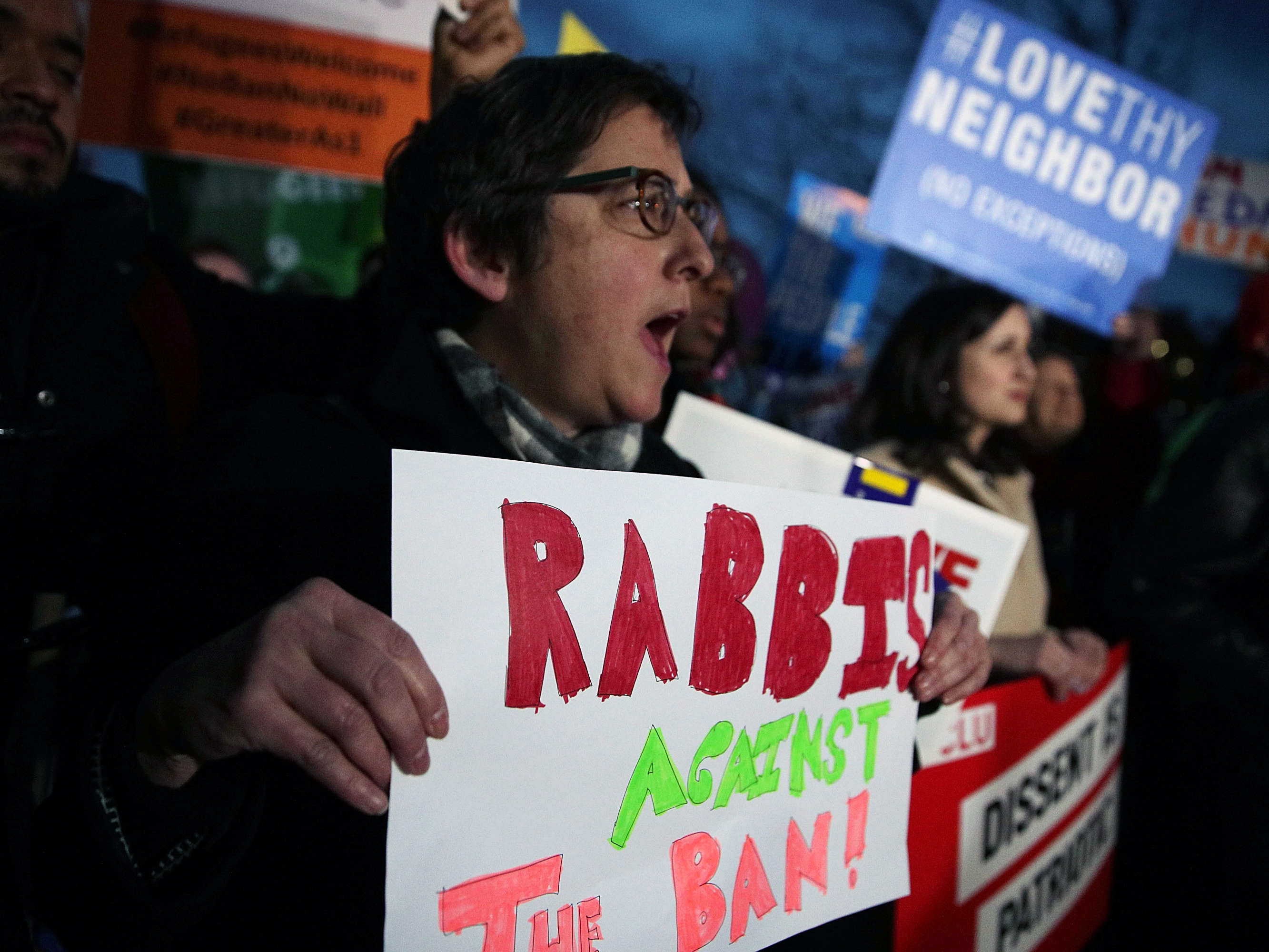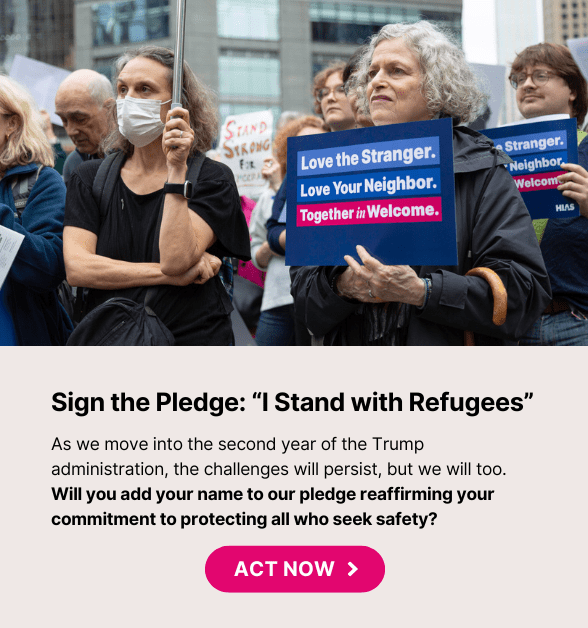Muslim Ban Lawsuit Moves Forward on Monday
By Rachel Nusbaum, HIAS.org
May 05, 2017

Activists hold signs during a protest outside the White House on March 6, 2017, against President Trump's second Executive Order banning travel from certain muslim-majority countries.
(Alex Wong/Getty Images)
When President Trump issued his travel ban, disrupting the humanitarian effort to resettle refugee families fleeing persecution and war and stranding travelers from a list of majority-Muslim countries, the reaction was instantaneous. Americans across the country dropped what they were doing and headed to airports to help, and to express their outrage.
Some families have since been reunited and a court ruling enjoining the enforcement of the ban has allowed refugee resettlement to resume, for now, but the Trump administration issued a second order and is still defending it in court.
HIAS is proud to be part of a lawsuit challenging that order. We are fighting for immigration and refugee policies that do not discriminate based on religion, and that allow our country to continue to be a safe haven for persecuted people.
On March 15, lawyers from the ACLU and NILC argued our case before U.S. District Judge Theodore Chuang in a federal court in Greenbelt, Maryland. Judge Chuang ruled that there is “a convincing case that the purpose of the Second Executive Order remains the realization of the long-envisioned Muslim ban,” and partially enjoined the implementation of the order.
More than 160 tech companies have weighed in, urging the Fourth Circuit court to rule against the ban. “Like the first Executive Order, the second Order effects a fundamental shift in the rules governing entry into the United States, and is inflicting substantial harm on U.S. companies, their employees, and the entire economy,” these leading tech companies write.
There are also expected financial costs. New York City alone stands to lose more than one billion dollars in tourism spending, according to testimony by a senior NYC tourism official at a recent City Council hearing.
But the real damage will go beyond the financial. This ban impacts real families whose lives have been upended by this arbitrary and unconstitutional ban.
It certainly hit Elias* hard.
Elias and his sister fled the violence in Syria and now live in the U.S., but they worry every day about their parents. Their mom and dad have been just barely scraping by in Jordan for the last four years, and they are heartbroken at being separated from their children and grandchildren. They were hoping to be reunited—before the ban they had been interviewed several times by both UNHCR and the U.S. government—but with President Trump’s attempts to ban refugees (and particularly Muslim refugees), Elias is not sure what will happen next or if he will ever see his parents again.
Kateryna is also feeling the ban in a deeply personal way. The 23-year-old dental assistant lives in Cleveland, Ohio and she worries day and night about the loved ones she left behind in Ukraine. She too was hoping to reunite with family before the refugee ban was signed and all travel screeched to a halt.
Her family was supposed to arrive in mid-March, but when the order was signed their travel was canceled. While they were waiting to hear what would happen, their medical checks—one of the many stages of vetting refugees must clear before coming to the U.S.—expired. Even though a court has now enjoined the order, Kateryna and her family have no idea if their expected reunion will ever happen. They are still trying to get another medical exam scheduled.
“Everyone was really shocked,” she said. “I was sick for a week because I was so stressed. I just didn’t know what to do.” She worries most about her sister-in-law, who is five months pregnant and nearing the point where she may not be allowed to fly. She hopes to see her family soon, but she won’t feel at ease until they are standing beside her.
Kateryna and Elias are just two of the many people who have suffered, and are still suffering, because of the disruptive impact Trump’s travel ban had in the short period of time it was in effect.
We’re going to court to make sure that this unconstitutional and damaging ban isn’t ever reinstated.
On Monday, May 8, we’ll make our case before the Fourth Circuit Court of Appeals in Richmond, Virginia.
Our case, as well as the challenge playing out in the Ninth Circuit Court of Appeals, is not the only part of this fight.
Even if we win—and we expect to, given the strength of our case—there will be many more challenges ahead. Those of us who are committed to welcoming refugees–to offering freedom, safe haven and humanitarian assistance to the persecuted and to families fleeing unspeakable violence—will have to keep fighting for those beliefs.
The stakes are high, but with the constitution on our side and the strong support of so many, we believe we can prevail.
Due to heightened public interest in the case, the Fourth Circuit court has agreed to allow a rare live audio feed of Monday’s arguments. Click here to listen in on C-SPAN on Monday at 2:30pm.
*Name has been changed



